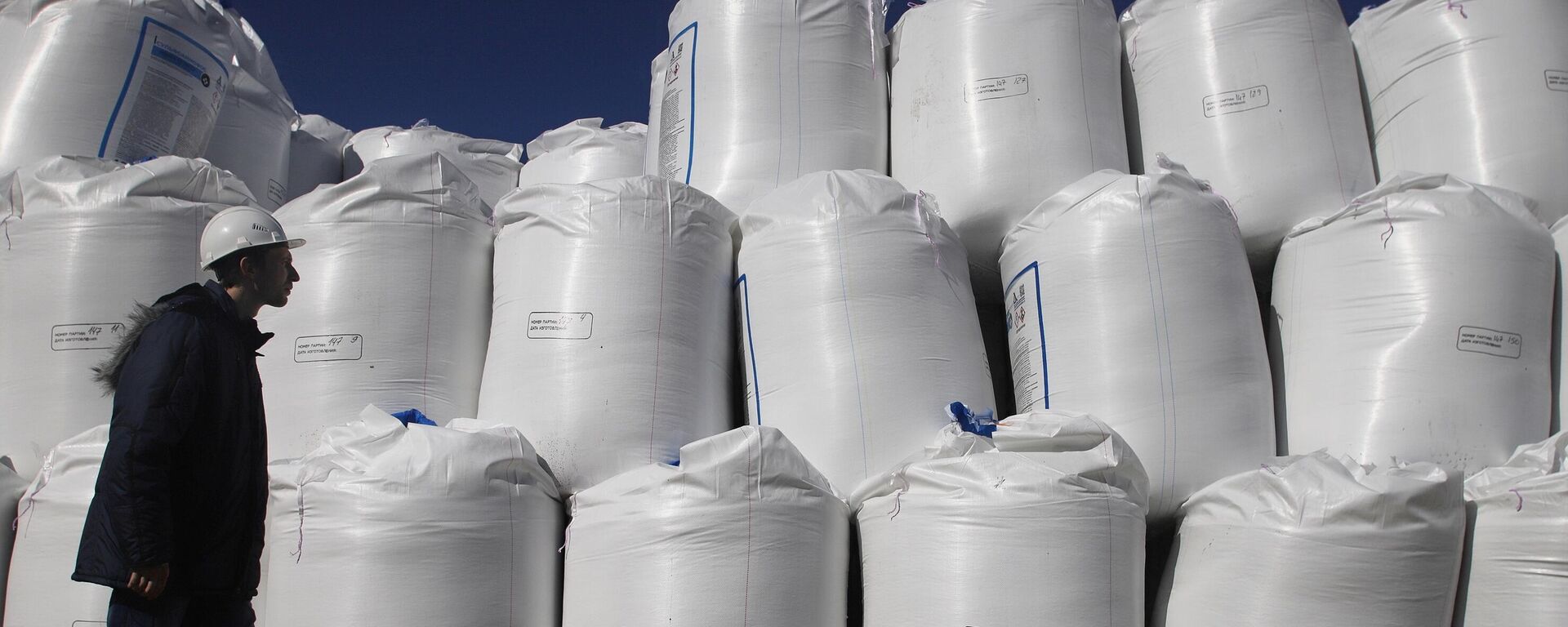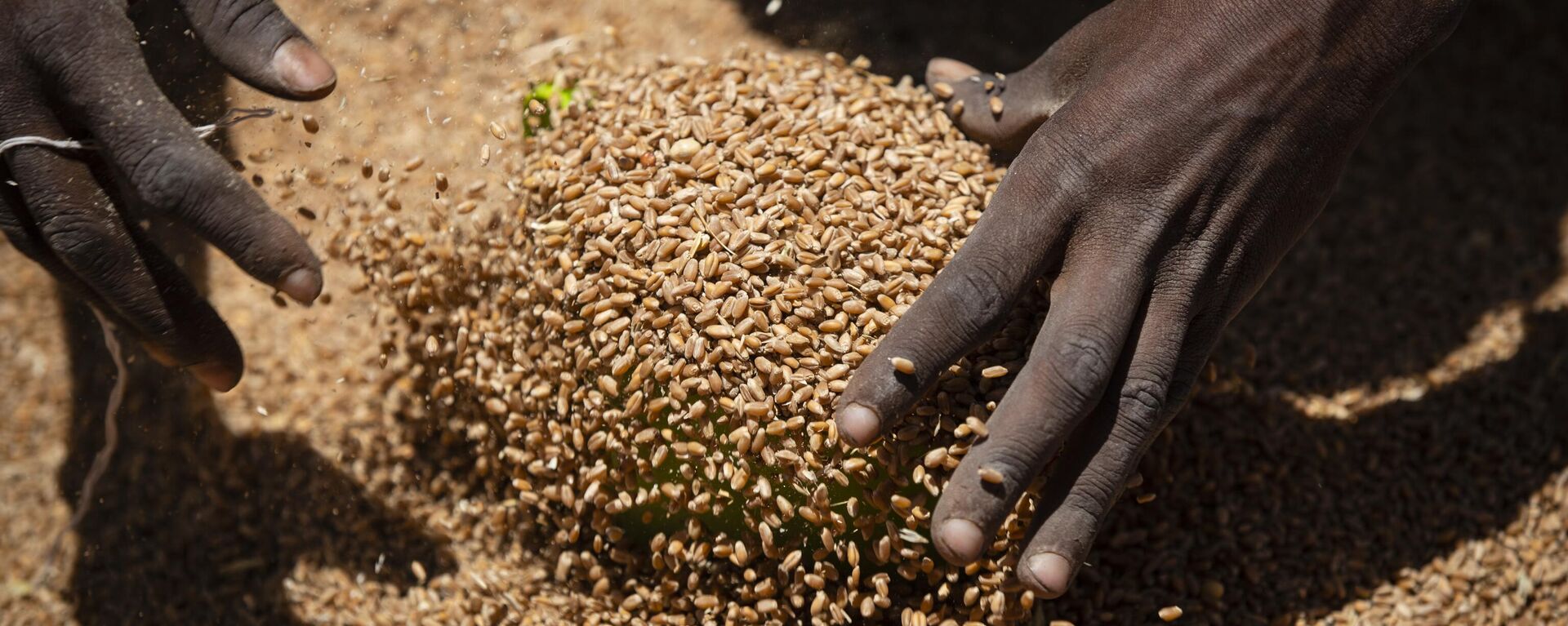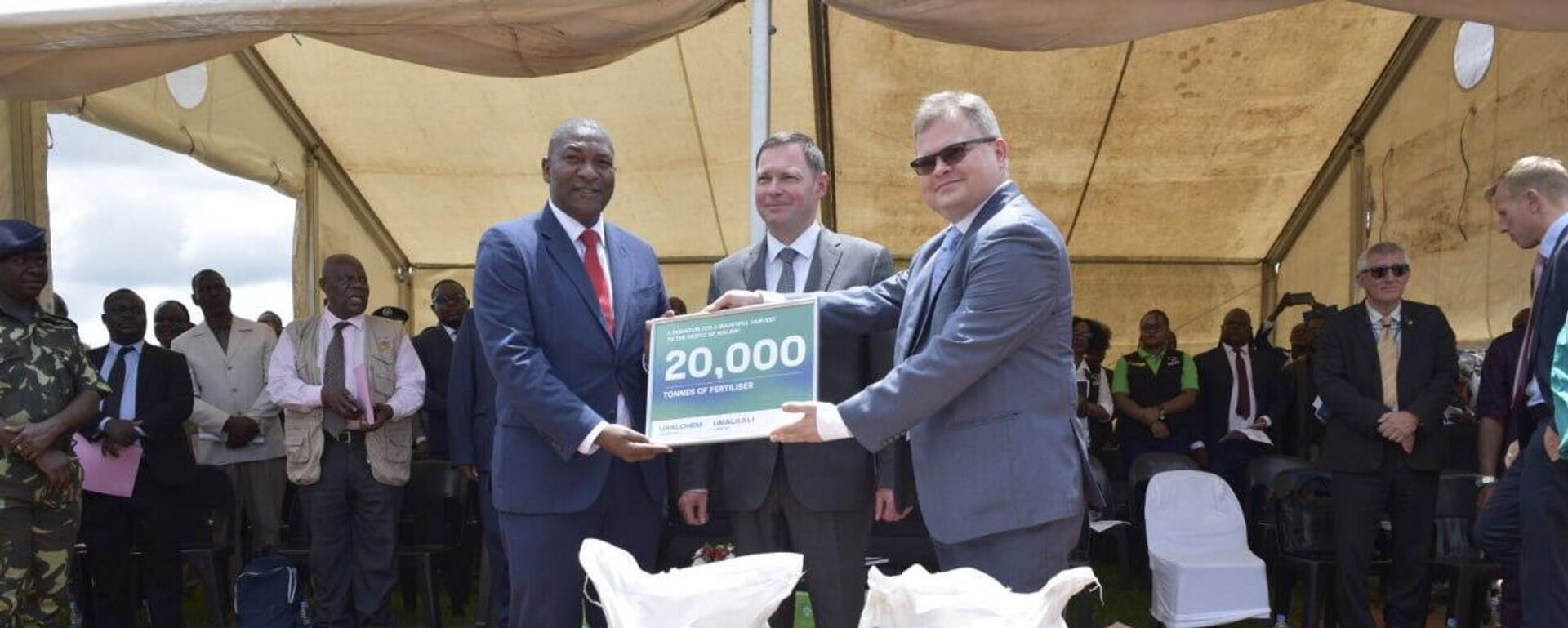https://sputnikglobe.com/20230422/first-batch-of-russian-fertilizers-departs-latvia-for-kenya-1109760730.html
First Batch of Russian Fertilizers Departs Latvia for Kenya
First Batch of Russian Fertilizers Departs Latvia for Kenya
Sputnik International
Russian fertilizers were stuck in Latvia thanks to EU sanctions against Russian companies. Russia is committed to supply developing nations with mineral fertilizers as humanitarian aid.
2023-04-22T12:21+0000
2023-04-22T12:21+0000
2023-04-22T12:21+0000
fertilizer
kenya
uralchem
humanitarian aid
africa
russia
europe
https://cdn1.img.sputnikglobe.com/img/07e6/0c/11/1105544551_0:160:3073:1888_1920x0_80_0_0_f54e0aef9a97c78ebe14f32d5ff7b6d3.jpg
The WFP is planning to deliver more shipments of the sanctioned mineral fertilizers from Latvia to support countries in need, the ministry added.Earlier, Uralchem-Uralkali Group announced that a humanitarian shipment of 34,000 tonnes of fertilizer for Kenya has been fully loaded onto a vessel in Riga and has started its journey to Mombasa."We believe that access to food is a basic human right and that the ongoing unprecedented food insecurity crisis can be alleviated only by joint efforts. As one of the major global producers of fertilizers we continue to donate our plant nutrients to those who need it the most," he added.In November, Uralchem-Uralkali Group, one of Russia's largest producers of mineral fertilizers, said that the ports of Estonia, Latvia, Belgium and the Netherlands blocked more than 260,000 tonnes of the company's fertilizers. Head of Uralchem Dmitry Mazepin explained that his company was unable to pay for freight because of the restrictive measures, but negotiated help from the United Nations. Accoridng to the Uralchem-Uralkali CEO, the company is committed to donating a total of approximately 300,000 tonnes of mineral fertilisers to developing nations to alleviate the unprecedented global food crisis and prevent significant crop loss in countries that face such risks.Moscow has offered to supply Russian fertilizers blocked in the ports of Latvia, Estonia, Belgium and the Netherlands to the poorest countries free of charge. According to the Russian Foreign Ministry, as much as 262,000 tonnes of Russian fertilizers are stuck in European ports. The first batch of Russian fertilizers stuck in Europe since September 2022, amounting to 20,000 tonnes, was shipped from the Netherlands to Malawi.
https://sputnikglobe.com/20230121/west-begins-to-realize-refusal-of-russian-fertilizers-bad-choice-senior-russian-official-1106545348.html
https://sputnikglobe.com/20230327/how-does-us-humanitarian-aid-influence-local-african-wheat-market-1108837522.html
https://sputnikglobe.com/20230306/malawi-praises-first-fertilizer-shipment-from-russia-as-essential-for-tackling-food-crisis-1108083762.html
kenya
africa
russia
Sputnik International
feedback@sputniknews.com
+74956456601
MIA „Rossiya Segodnya“
2023
Sputnik International
feedback@sputniknews.com
+74956456601
MIA „Rossiya Segodnya“
News
en_EN
Sputnik International
feedback@sputniknews.com
+74956456601
MIA „Rossiya Segodnya“
Sputnik International
feedback@sputniknews.com
+74956456601
MIA „Rossiya Segodnya“
russia humanitarian aid, russian fertilizers, support for kenya, humanitarian aid, developing nations
russia humanitarian aid, russian fertilizers, support for kenya, humanitarian aid, developing nations
First Batch of Russian Fertilizers Departs Latvia for Kenya
MOSCOW (Sputnik) - The World Food Programme (WFP) has dispatched the first batch of Russian mineral fertilizers from Riga to Kenya of around 200,000 tonnes. The fertilizar was stuck in Latvia due to the EU sanctions, the Latvian Foreign Ministry said on Saturday.
"On April 21, 2023, the World Food Programme sent a shipment of mineral fertilisers from Riga Port, heading for Kenya. This is the first cargo from about 200,000 tonnes of fertilizers of Russian origin owned by companies subject to the European Union’s restrictive measures and stored in the territory of Latvia," the statement read.
The WFP is planning to deliver more shipments of the sanctioned mineral fertilizers from Latvia to support countries in need, the ministry added.

21 January 2023, 05:42 GMT
Earlier, Uralchem-Uralkali Group announced that a humanitarian shipment of 34,000 tonnes of fertilizer for Kenya has been fully loaded onto a vessel in Riga and has started its journey to Mombasa.
"Fertilizers play an immensely important role in global food security systems and over 40% of the world population depends on agricultural items grown with the help of plant nutrients. The surges in fertiliser prices that took place in recent years led to significant cutbacks in food production, especially among smallholder farmers from the developing world. And this has put millions of people at risk of starvation," Dmitry Konyaev, Uralchem CEO, said.
"
We believe that access to food is a basic human right and that the ongoing unprecedented food insecurity crisis can be alleviated only by joint efforts. As one of the major global producers of fertilizers we continue to donate our plant nutrients to those who need it the most," he added.
In November, Uralchem-Uralkali Group, one of Russia's largest producers of mineral fertilizers, said that the ports of Estonia, Latvia, Belgium and the Netherlands blocked more than 260,000 tonnes of the company's fertilizers. Head of Uralchem Dmitry Mazepin explained that his company was unable to pay for freight because of the restrictive measures, but negotiated help from the United Nations.
Accoridng to the Uralchem-Uralkali CEO, the company is committed to donating a total of approximately 300,000 tonnes of mineral fertilisers
to developing nations to alleviate the unprecedented global food crisis and prevent significant crop loss in countries that face such risks.
Moscow has offered to supply Russian fertilizers blocked in the ports of Latvia, Estonia, Belgium and the Netherlands to the poorest countries free of charge. According to the Russian Foreign Ministry, as much as 262,000 tonnes of Russian fertilizers are stuck in European ports. The first batch of Russian fertilizers stuck in Europe since September 2022, amounting to 20,000 tonnes, was shipped from the Netherlands to Malawi.





